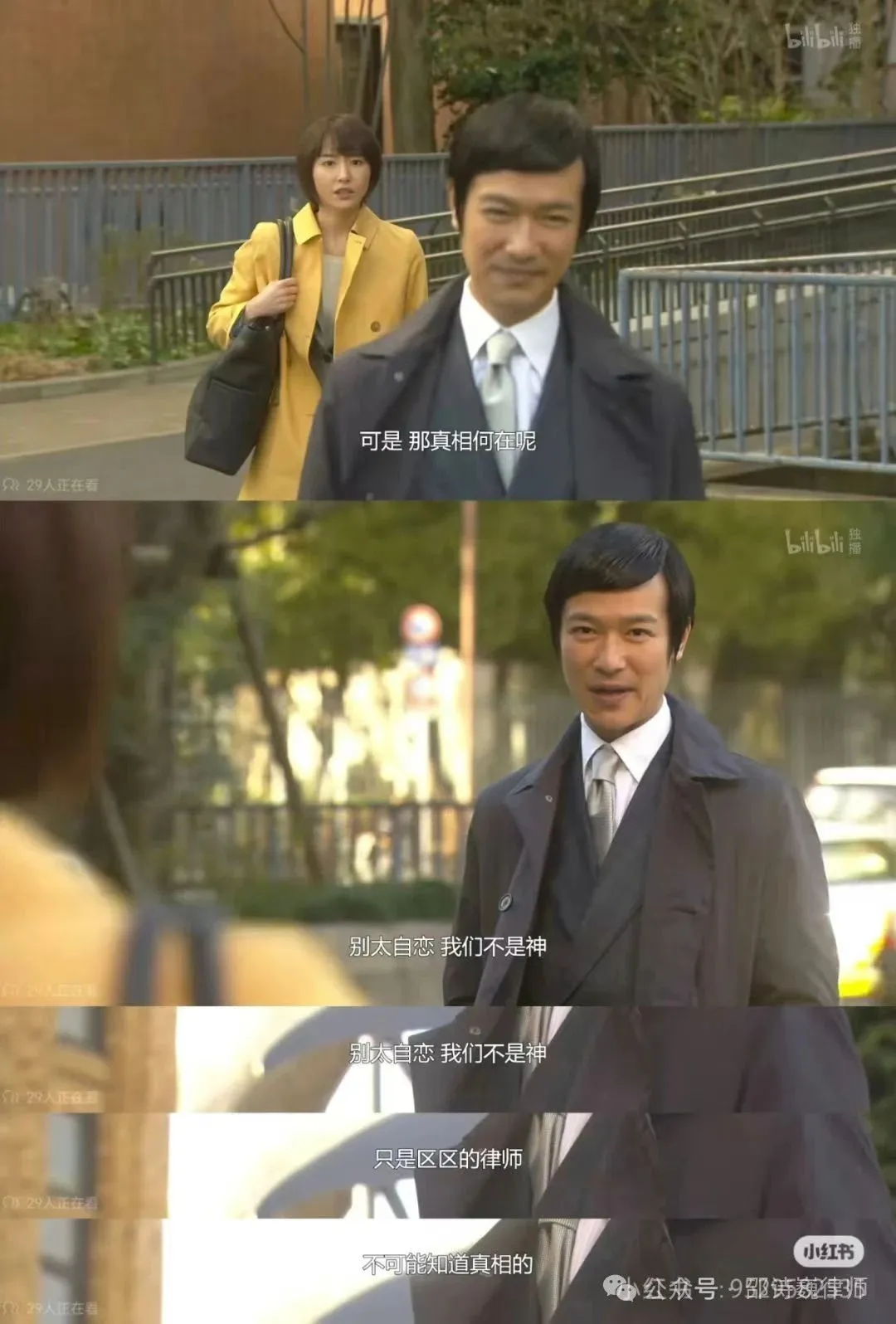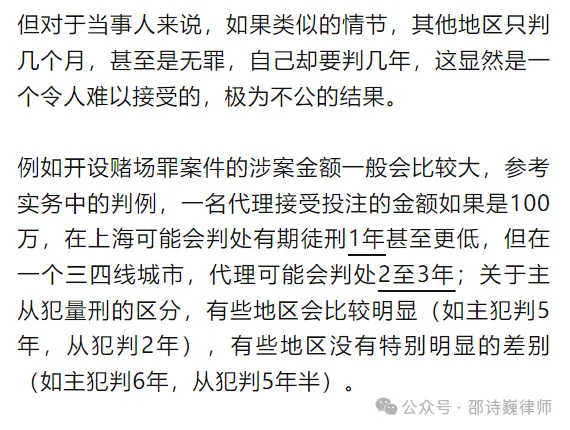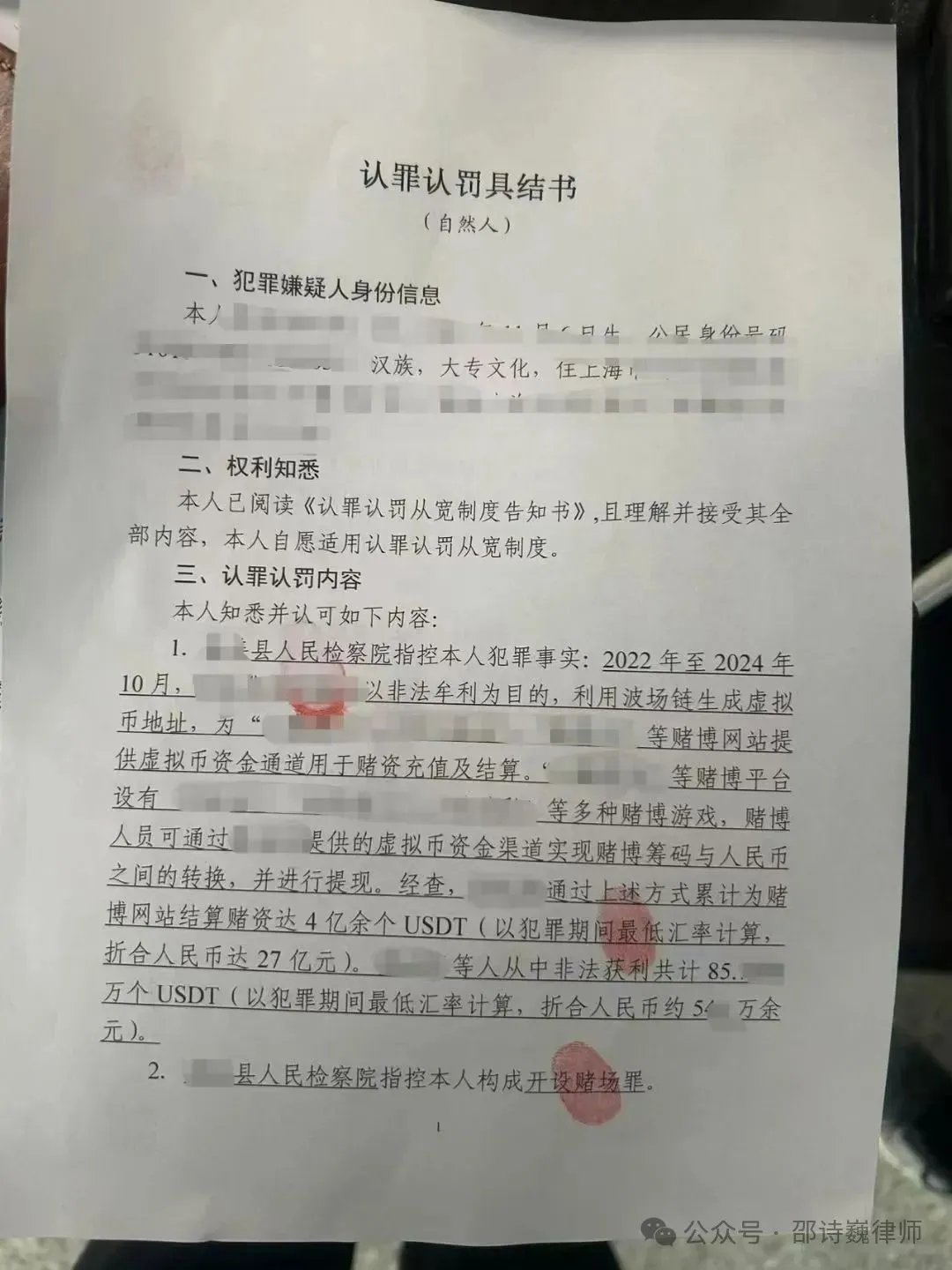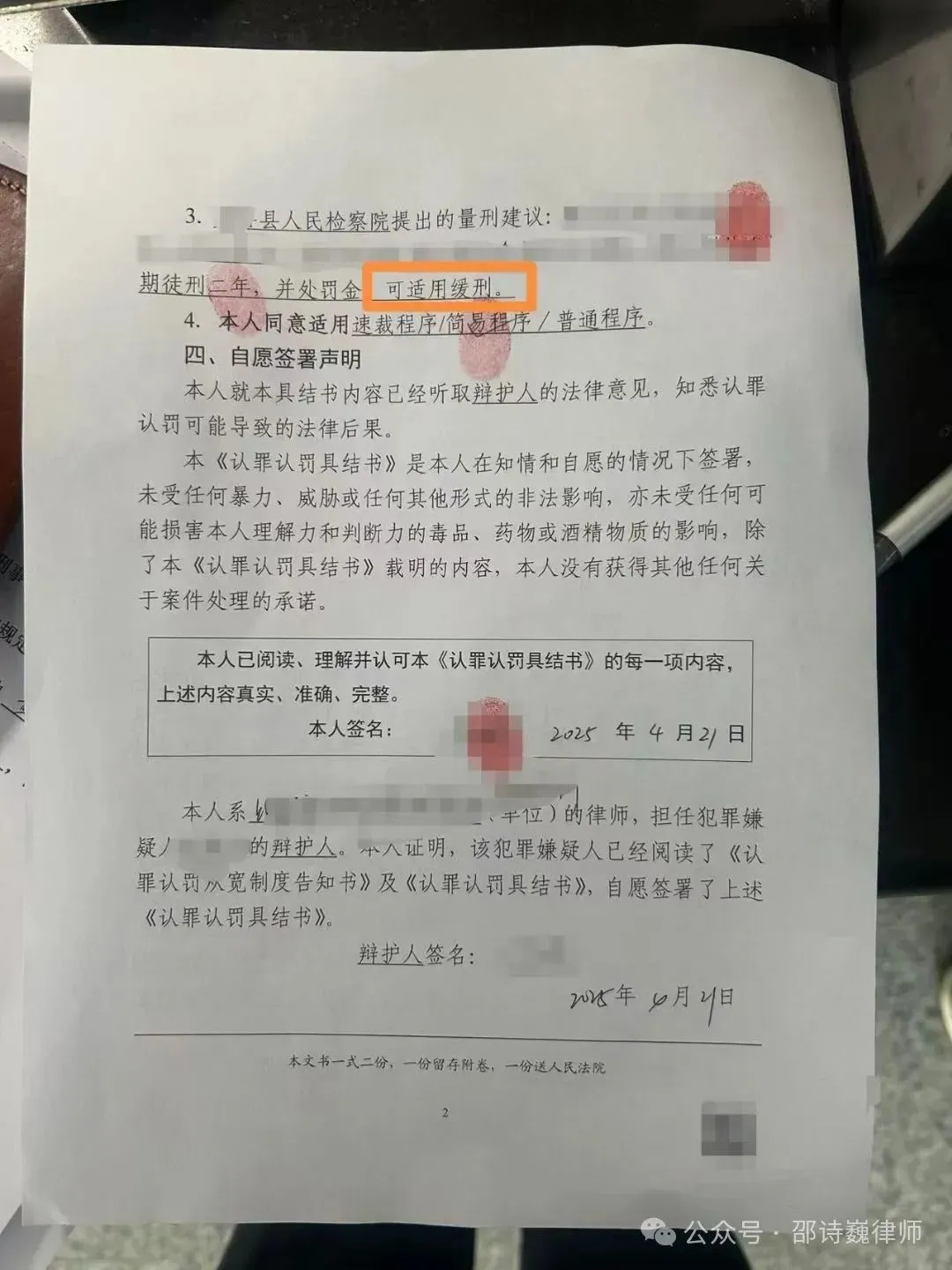By Shao Shiwei, Attorney at Law | Mankiw LLP
Original link: https://mp.weixin.qq.com/s/lwmBHHrFFm4PdGV_meL-Wg
Disclaimer: This article is a reprint. Readers can find more information by following the original link. If the author has any objections to the reprint format, please contact us and we will modify it to suit the author's request. This reprint is for informational purposes only and does not constitute investment advice or represent the views or positions of Wu Blockchain.
Success Stories
In criminal cases, many parties and their families assume that a lawyer's job is to "argue with reason and be eloquent." However, in reality, in some cases with clear-cut convictions and limited sentencing options, truly effective defense often involves more than simply confronting judicial authorities. Instead, it tests a lawyer's communication skills.
Especially in the current context of the guilty plea and admission system , the procuratorate's sentencing recommendations often play a key role in the ultimate outcome of a case. At this stage, whether a lawyer can understand the mindsets of the case officers, grasp their true concerns and priorities in a specific case, and engage in professional communication based on seeking common ground while reserving differences often determines the outcome of the case.
In other words, a lawyer's expertise isn't just reflected in their grasp of legal theory, but also in their ability to earn the trust of the case officers. When a lawyer's opinions are recognized by the case officers, it often opens up opportunities for the client to seek leniency.
So, how can one better understand the psychology of case handlers? There's no standard answer; it relies heavily on long-term case-handling experience, but there are also approaches that are not completely impossible. This article will illustrate how lawyer Shao Shiwei, in a case involving virtual currency settlement and a charge of operating a casino , employed specific strategies to achieve an effective defense.
A programmer is suspected of operating a casino in the "virtual currency payment and settlement" category
A few months ago, I took over a case involving the opening of a casino: the client was a programmer who was accused of providing virtual currency payment and settlement services for multiple overseas gambling websites, suspected of committing the crime of opening a casino.
According to the charges of the public security authorities, the programmer helped multiple gambling platforms complete gambling fund settlements totaling more than 400 million USDT in the past two years, equivalent to about 2.7 billion yuan; he personally made illegal profits of more than 900,000 USDT, about 6 million yuan.
According to Article 303 of the Criminal Law on the crime of opening a casino, if the cumulative amount of gambling funds reaches 300,000 yuan, or the illegal income exceeds 30,000 yuan, it is considered "serious circumstances" and is usually punishable by imprisonment of not less than five years and not more than ten years.
Faced with a case like this with clear-cut characterization, clear data, and a massive sum of money, what else can lawyers do? Where is the room for defense?
A "death without evidence" dilemma
When I took over the case, the public security investigation stage had come to an end, the evidence had been collected, and the case had been transferred to the procuratorate for review and prosecution.
This article focuses on the communication work of lawyers at the procuratorate stage, because since the implementation of the confession and admission of guilt system, the sentencing recommendations given by prosecutors have played a crucial role in the final sentence imposed by the court on the parties involved.
After initial communication with the family, I learned that the person involved in this case actually had two other partners. The three of them operated as a studio, contacting external gambling platforms and independently handling business. However, one partner has passed away, and the other disappeared after the incident. The person involved was immediately arrested at the airport upon returning to China by police who had been staking out the case for a long time.
From the perspective of the lawyer's defense, what was the division of labor among the three individuals? How was the profit distribution agreed upon regarding the over 900,000 USDT? This fact is crucial. The suspect was apprehended red-handed at the airport without any warning, so it cannot constitute a voluntary surrender. Besides conventional defense points like the amount of gambling funds and profits, only by establishing his accomplice status can his sentence be reduced to less than five years.
But this is another case of "no evidence" in the death row. To quote the original words the case handler told the client during interrogation, "Who knows if what you said is true? We only know that you built the contract logic, and it was you who communicated with the gambling platform in the TG group. You said you had two partners, but A is nowhere to be found, and B is long dead. So, do you think you did it alone? No matter how we investigate, it's only you!"
To be honest, I still don't know whether the other two partners really existed. But for lawyers, the truth is not important. What matters is how to obtain a lighter sentence for the client based on the existing evidence.

Can studying and analyzing previous similar cases in the local area be helpful to this case?
In addition to the law itself, local past judgments are also an important reference for developing a defense strategy. As I mentioned in my previous article, "Same Case, Different Verdicts? A Study of the Issue of Territorial Jurisdiction in Criminal Cases" (see figure below), it is not uncommon for different verdicts to be given in different regions, even for the same crime.

I conducted an in-depth search for cases involving "opening a casino" and "virtual currency settlement" in the region in recent years, but the results were not encouraging. For example:
In the case of Chen et al., the defendants provided financial settlement for a gambling platform, with the gambling funds totaling over 90 million RMB. All of them were sentenced to actual prison terms.
In the case of Fang et al., who used an online gambling platform to open a casino, the defendants were sentenced to more than five years in prison despite having withdrawn 10 million yuan in illegal proceeds;
In addition, based on the relevant cases handled by our team, some case handlers believe that the use of virtual currency transactions is a circumstance that the court will refer to internally and should be considered for heavier punishment.
After in-depth research into relevant local cases, I've become even more aware that, in regional judicial practice, casino operations are virtually guaranteed to result in a prison sentence. Even more ominous, based on the available evidence, this case cannot be defended as an aiding and abetting crime—because the parties involved were not employees, and their subjective knowledge and intent to cooperate were clear, thus lacking the "auxiliary or subordinate" status.
Time was short and the task was heavy. By the time I received the case file, more than half of the prosecution period had already passed. There was no time to think too much, so I started with the first step of reviewing the case file and got to work!
Two core difficulties of the case
It took me a full five days to sort through nearly a thousand pages of files and dozens of gigabytes of electronic data.
I think there are two tricky aspects of this case:
First, as mentioned above, the co-defendants involved in the case are now "dead and unable to testify." So, how can one determine the principal's role in the gang? Furthermore, the public security authorities' description of the case in the case file makes no mention of the principal or accomplice, nor does it mention any team members. All the actions involved in the case are attributed to the principal alone: connecting to the gambling platform, building the contract logic, using TG communication, and controlling the wallet address were all performed by the principal. Even no staff from the gambling website have appeared in court. This further exacerbates the perception that the principal acted alone.
Another factor is on-chain transaction data. This type of data is inherently public and objective. Even if the public security authorities made some omissions in their statistics, how much can be deducted from the 2.7 billion yuan in gambling funds and over 6 million yuan in profits?
Could we suggest further arrests of other partners or platform personnel? Of course, we could. However, these individuals are highly resistant to investigation and are very likely outside the country. Given the current criminal investigation system, such a proposal involving cross-border evidence collection and arrests is virtually unfeasible. Public security agencies generally do not go through the complex international cooperation process for this purpose.
So I needed to think carefully about my communication approach. When communicating with prosecutors, what should I say and how should I say it? How can I negotiate a lower sentence for my client?
How to communicate? Is "hard fight" useful?
In practice, there's a type of lawyer whose approach to handling cases we in the industry refer to as "die-hard" lawyers. These lawyers often display a fiercely confrontational nature when defending clients. They typically employ a "challenging, competitive, uncompromising, refusing to concede, and persevering until their goals are achieved" approach, forcefully arguing over legal issues in the case. They engage in tit-for-tat communication with case handlers, and even expose issues online, leveraging public pressure to influence the case's outcome.
This style of defense can indeed be effective in some highly influential and controversial cases involving acquittal. However, in situations like this one, where the nature of the case is already clear and the focus of the dispute is on the sentencing range, such a "hard-nosed" approach is often not only ineffective but can even be counterproductive. In the eyes of judicial authorities, an improper confession attitude and poor communication ultimately lead to a heavier sentence, and such situations are not uncommon in our case handling.
Does this mean that cases like this one, where the nature of the offense is clear, can simply "lay low and go through the motions, plead guilty and accept punishment"? Of course not. In cases where the nature of the offense is clear, we can still employ effective defense strategies to secure lenient sentences for our clients.
Of course, the specific strategy for defending a client's lesser offense requires analysis based on the specific case. Beyond the evidence itself, it also requires a comprehensive consideration of the stage of the case, the individual personality and style of the person handling the case, their understanding of the law, and their overall assessment of the facts of the case. Sometimes, the same case can unfold in completely different directions in the hands of different investigators.
Initial confrontation with prosecutors
One morning, I made an appointment to meet with the prosecutor in charge. I arrived at the prosecutor's office early to wait, but when I walked into his office, I was struck by the heaviness of the piles of case files on his desk.
He seemed incredibly busy, the landline on his desk ringing repeatedly, hanging up and then ringing again. I sat in the chair opposite him, silently waiting—waiting for the right moment to interrupt.
The ringing finally died down. He looked up, glanced at me, and said flatly, "There's nothing controversial about this case. Let's plead guilty and accept punishment as soon as possible. Time is almost up. We have a lot of cases, and the court wants to prosecute them quickly."
I took the opportunity to ask the first question: "What are your current considerations regarding sentencing?"
He flipped through the file and said impatiently: "He said the code was written by two partners? B has been dead for many years, so it was written by B? You have also read the file. There is no trace of A in this case. We don’t even know if this person exists. I guess he made it up!" With such a large amount of money, referring to other cases we handled, the sentence should be at least 7 to 8 years."
At that moment, I could feel the obvious qualitative tendency in his tone - his views on the case were basically consistent with those of the public security organs.
Frankly, the documents alone confirm this: he was the one connecting to the gambling platform; he was the one designing the contract logic; he controlled the wallet address (and it wasn't multi-sig); and in the TG chat logs, he was the only one communicating with the platform. While he claimed to only receive a fixed salary, he also claimed he hadn't received any payouts in years, and couldn't even clarify who received how much. Furthermore, in the initial transcripts, he didn't even mention any so-called "partners."
In this situation - not to mention the prosecutor, what would any ordinary person think based on preconceived notions?
How to achieve “effective communication”?
In fact, before meeting with the prosecutor, I had repeatedly reviewed all the key evidence points in the case - it can be said that I went to meet him with clear communication goals and preparations. His initial response did not surprise me.
Next, I began asking questions about my opinions on the case. Initially, the prosecutor wasn't particularly interested in my opinions. After all, in cases like this involving "guilty plea and punishment with clear data," investigators usually just go with the process.
But then I said, "If the procuratorate does not withdraw the investigation and just brings the case to justice, do you think the judge will ask the procuratorate to provide additional evidence?" Just this one sentence made him visibly stunned. Then, he put down the work at hand, took out his notebook and began to take notes.
While the case's classification may appear uncontroversial, it is plagued by numerous substantive and procedural flaws, such as the process for judicial disposal and liquidation of virtual currency, the calculation method for the amount involved, and the identification method. Furthermore, hastily designating a party as the principal offender can lead to complications. If the defense insists on a return of investigation, this will be a significant headache for prosecutors, who are handling a cryptocurrency case for the first time. The available evidence has already been obtained, and even if the case is returned to the public security authorities, it would be difficult to produce any more compelling evidence, as in this case.
In short, I noticed the prosecutor's expression grow more serious the more he wrote down my opinion. Well, that meant he took my opinions seriously. After two or three hours of communication that morning, he finally said, "Okay, your opinions do make sense. I've taken note. I'll need to discuss them with my superiors, and some details will need to be confirmed with the police before I can get back to you." I knew I had achieved the purpose of this communication.
Over the next few days, I continued to push forward. I maintained online communication with the prosecutor, repeatedly discussing the key issues in the case point by point.
As wished


In the end, the sentencing recommendation for this case was gradually reduced from the "at least seven or eight years" initially stated by the prosecutor.
First, we persuaded him to reduce the sentencing recommendation to less than five years, then we further discussed three years of actual imprisonment, then "three years in prison, suspended for five years", and finally, we settled on a result that really satisfied me and the client: sentenced to two years in prison, suspended for three years.
To the uninitiated, this might seem like a miracle.
But for me, every adjustment, every persuasion, and every controlled rhythm of communication were all part of the steady progress of my work plan. Due to space limitations, I will share my case handling ideas and details of my communication with the prosecutors later.
When the final decision was finalized with the prosecutor over the phone, the prosecutor said:
"It is indeed thanks to you lawyers that the leaders of the court finally agreed to the result of this case. The work of the defense lawyers was indeed very thorough. We also admit that your views are indeed very reasonable."
To be honest, this is the first time I have heard such words from a prosecutor in my eight years of practice. After all, everyone in the industry knows that although it is called a "professional community", in how many cases do the contractors and lawyers respect and recognize each other?
The client was very satisfied with the final result, so he successfully signed a confession and the case was transferred to the court. However, the court stage was not smooth sailing.
Not long after the case went to court, my partner, Lawyer Ding, received a call from the judge.
"How did the procuratorate come up with this sentencing recommendation? The maximum is less than five years. How could probation be applied?"
When we heard this, our hearts tightened. After all, the sentencing recommendation of the procuratorate is just a suggestion, and the final decision is still in the hands of the judge.
I won’t go into detail about the twists and turns in between. In short, after a close call, the court finally adopted the sentencing recommendation of the procuratorate, and the verdict was officially implemented: sentenced to two years in prison and three years of probation.
As an aside, the judge was quite interesting. Afterwards, he quietly asked us, "How did you communicate with the prosecutor? They usually don't hang us." (These are the judge's exact words)
Review: Finding hope in the cracks
I often say that the job of a criminal defense lawyer is often to find hope in the cracks.
The ideal outcome of the case is actually based on the careful analysis of the lawyer's litigation strategy and good communication with the person in charge at every step. Every step of the work requires the right rhythm and good control of the degree.
The case itself is clearly defined, the amount involved is high, and the parties involved have voluntarily pleaded guilty, stating that they have no objection to the facts and the amount calculated by the case-handling unit. This is a case that seems to have "no room for maneuver." However, I have always believed that no matter how difficult and complex a case is, as long as there is no final judgment, there is always room for communication and adjustment. The problem is not to deny anything, but to find a breakthrough point and, within the existing evidence structure, encourage the handling authorities to make a judgment more favorable to the parties involved.
The breakthrough point of this case is not to question the basic facts of the case that have been clearly defined, but to accurately identify the possible concerns of the case handlers, find their "most unacceptable risks", and then, based on these risks, promote adjustments to the way the case is handled.
Throughout the defense process, we didn't shy away from the severity of the case or blindly challenge the characterization. Instead, we designed our strategy from the perspective of "smoothing the case through to a smooth conclusion while maintaining a reasonable penalty." In short, empathizing with the case officers and formulating appropriate defense arguments, ultimately securing a favorable outcome for the client, was a key factor in achieving a favorable outcome for this case.
Thank you for your trust
In fact, the family of this case came to me after being introduced by Lawyer Ding Yue from Shanghai Shuke Law Firm.
Frankly, over the years I've been a lawyer, I've received numerous cases referred by colleagues. However, this kind of trust among colleagues isn't easy to come by. After all, a recommendation itself is a form of professional endorsement. If the lawyer who referred me botches the case, the referrer would also be embarrassed. This case, especially one like this one, is new and complex, with a high stakes involved, making it a very difficult case for any lawyer.
Attorney Dante didn't hesitate at all and immediately recommended me to the family. She told them, "Attorney Shao handles many virtual currency and casino cases and has extensive experience. I hope I can join this case."
I was actually quite moved by what she said. We hadn't met before, but she was willing to sincerely recommend me to the family without any personal connection. This kind of trust essentially puts the client's interests first.
Throughout the entire case handling process, our collaboration was seamless. From discussing case strategy to communicating with the family and preparing materials, we were able to work together seamlessly. I also highly value her professionalism, sincerity, kindness, and sense of responsibility towards the client and their family throughout the entire case.
postscript
After writing this article, I still want to add a few words. Maybe they have nothing to do with the case itself, but they are related to the often-mentioned topic of why lawyers defend "bad guys".
Some might say, "What's the point of defending this kind of case? Gambling has ruined so many families. People like this deserve a heavy sentence!" You lawyers are just helping bad guys get away with it, turning black into white.
But in the process of handling hundreds of criminal cases, both large and small, I also realized that as criminal lawyers, what we deal with is never abstract "crimes," but rather specific individuals. Behind each person is a family, or even several families.
Also, even if each person's behavior is ultimately classified as a crime, there are specific reasons from their perspective.
In this case, the client had been working abroad for years to make a living. Because he had experience in cryptocurrency trading and was a programmer with coding skills, he was introduced to a job helping the platform process fund settlements. While this decision was undoubtedly a mistake, his original intention was to earn more money and provide a better life for his family.
Although he has made a lot of money from this business over the past two years, he has always lived frugally, which is why he has barely touched the money in his exchange account. Besides cashing out a small amount when needed and sending it to his family back home for living expenses, he saves the rest for his children's future education and living expenses. He knows that due to his illness, he may not be able to see his children go to college, so he works so hard to earn money, hoping to leave more for them while he is still alive.
Yes, he did break the law, but he has already borne the consequences: he was detained for over six months and paid the illegal gains and fines. But if he continues to be detained for a long time in the future, his family will fall into deeper trouble.
We never deny the harmful effects of crime. But often, lawyers aren't just defending an accused person; they're also saving a family on the brink of collapse. Perhaps this is one of the true meanings of criminal defense.
Original link: https://mp.weixin.qq.com/s/lwmBHHrFFm4PdGV_meL-Wg
Disclaimer: This article is a reprint. Readers can find more information by following the original link. If the author has any objections to the reprint format, please contact us and we will modify it to suit the author's request. This reprint is for informational purposes only and does not constitute investment advice or represent the views or positions of Wu Blockchain.
Success Stories
In criminal cases, many parties and their families assume that a lawyer's job is to "argue with reason and be eloquent." However, in reality, in some cases with clear-cut convictions and limited sentencing options, truly effective defense often involves more than simply confronting judicial authorities. Instead, it tests a lawyer's communication skills.
Especially in the current context of the guilty plea and admission system , the procuratorate's sentencing recommendations often play a key role in the ultimate outcome of a case. At this stage, whether a lawyer can understand the mindsets of the case officers, grasp their true concerns and priorities in a specific case, and engage in professional communication based on seeking common ground while reserving differences often determines the outcome of the case.
In other words, a lawyer's expertise isn't just reflected in their grasp of legal theory, but also in their ability to earn the trust of the case officers. When a lawyer's opinions are recognized by the case officers, it often opens up opportunities for the client to seek leniency.
So, how can one better understand the psychology of case handlers? There's no standard answer; it relies heavily on long-term case-handling experience, but there are also approaches that are not completely impossible. This article will illustrate how lawyer Shao Shiwei, in a case involving virtual currency settlement and a charge of operating a casino , employed specific strategies to achieve an effective defense.
A programmer is suspected of operating a casino in the "virtual currency payment and settlement" category
A few months ago, I took over a case involving the opening of a casino: the client was a programmer who was accused of providing virtual currency payment and settlement services for multiple overseas gambling websites, suspected of committing the crime of opening a casino.
According to the charges of the public security authorities, the programmer helped multiple gambling platforms complete gambling fund settlements totaling more than 400 million USDT in the past two years, equivalent to about 2.7 billion yuan; he personally made illegal profits of more than 900,000 USDT, about 6 million yuan.
According to Article 303 of the Criminal Law on the crime of opening a casino, if the cumulative amount of gambling funds reaches 300,000 yuan, or the illegal income exceeds 30,000 yuan, it is considered "serious circumstances" and is usually punishable by imprisonment of not less than five years and not more than ten years.
Faced with a case like this with clear-cut characterization, clear data, and a massive sum of money, what else can lawyers do? Where is the room for defense?
A "death without evidence" dilemma
When I took over the case, the public security investigation stage had come to an end, the evidence had been collected, and the case had been transferred to the procuratorate for review and prosecution.
This article focuses on the communication work of lawyers at the procuratorate stage, because since the implementation of the confession and admission of guilt system, the sentencing recommendations given by prosecutors have played a crucial role in the final sentence imposed by the court on the parties involved.
After initial communication with the family, I learned that the person involved in this case actually had two other partners. The three of them operated as a studio, contacting external gambling platforms and independently handling business. However, one partner has passed away, and the other disappeared after the incident. The person involved was immediately arrested at the airport upon returning to China by police who had been staking out the case for a long time.
From the perspective of the lawyer's defense, what was the division of labor among the three individuals? How was the profit distribution agreed upon regarding the over 900,000 USDT? This fact is crucial. The suspect was apprehended red-handed at the airport without any warning, so it cannot constitute a voluntary surrender. Besides conventional defense points like the amount of gambling funds and profits, only by establishing his accomplice status can his sentence be reduced to less than five years.
But this is another case of "no evidence" in the death row. To quote the original words the case handler told the client during interrogation, "Who knows if what you said is true? We only know that you built the contract logic, and it was you who communicated with the gambling platform in the TG group. You said you had two partners, but A is nowhere to be found, and B is long dead. So, do you think you did it alone? No matter how we investigate, it's only you!"
To be honest, I still don't know whether the other two partners really existed. But for lawyers, the truth is not important. What matters is how to obtain a lighter sentence for the client based on the existing evidence.

Can studying and analyzing previous similar cases in the local area be helpful to this case?
In addition to the law itself, local past judgments are also an important reference for developing a defense strategy. As I mentioned in my previous article, "Same Case, Different Verdicts? A Study of the Issue of Territorial Jurisdiction in Criminal Cases" (see figure below), it is not uncommon for different verdicts to be given in different regions, even for the same crime.

I conducted an in-depth search for cases involving "opening a casino" and "virtual currency settlement" in the region in recent years, but the results were not encouraging. For example:
In the case of Chen et al., the defendants provided financial settlement for a gambling platform, with the gambling funds totaling over 90 million RMB. All of them were sentenced to actual prison terms.
In the case of Fang et al., who used an online gambling platform to open a casino, the defendants were sentenced to more than five years in prison despite having withdrawn 10 million yuan in illegal proceeds;
In addition, based on the relevant cases handled by our team, some case handlers believe that the use of virtual currency transactions is a circumstance that the court will refer to internally and should be considered for heavier punishment.
After in-depth research into relevant local cases, I've become even more aware that, in regional judicial practice, casino operations are virtually guaranteed to result in a prison sentence. Even more ominous, based on the available evidence, this case cannot be defended as an aiding and abetting crime—because the parties involved were not employees, and their subjective knowledge and intent to cooperate were clear, thus lacking the "auxiliary or subordinate" status.
Time was short and the task was heavy. By the time I received the case file, more than half of the prosecution period had already passed. There was no time to think too much, so I started with the first step of reviewing the case file and got to work!
Two core difficulties of the case
It took me a full five days to sort through nearly a thousand pages of files and dozens of gigabytes of electronic data.
I think there are two tricky aspects of this case:
First, as mentioned above, the co-defendants involved in the case are now "dead and unable to testify." So, how can one determine the principal's role in the gang? Furthermore, the public security authorities' description of the case in the case file makes no mention of the principal or accomplice, nor does it mention any team members. All the actions involved in the case are attributed to the principal alone: connecting to the gambling platform, building the contract logic, using TG communication, and controlling the wallet address were all performed by the principal. Even no staff from the gambling website have appeared in court. This further exacerbates the perception that the principal acted alone.
Another factor is on-chain transaction data. This type of data is inherently public and objective. Even if the public security authorities made some omissions in their statistics, how much can be deducted from the 2.7 billion yuan in gambling funds and over 6 million yuan in profits?
Could we suggest further arrests of other partners or platform personnel? Of course, we could. However, these individuals are highly resistant to investigation and are very likely outside the country. Given the current criminal investigation system, such a proposal involving cross-border evidence collection and arrests is virtually unfeasible. Public security agencies generally do not go through the complex international cooperation process for this purpose.
So I needed to think carefully about my communication approach. When communicating with prosecutors, what should I say and how should I say it? How can I negotiate a lower sentence for my client?
How to communicate? Is "hard fight" useful?
In practice, there's a type of lawyer whose approach to handling cases we in the industry refer to as "die-hard" lawyers. These lawyers often display a fiercely confrontational nature when defending clients. They typically employ a "challenging, competitive, uncompromising, refusing to concede, and persevering until their goals are achieved" approach, forcefully arguing over legal issues in the case. They engage in tit-for-tat communication with case handlers, and even expose issues online, leveraging public pressure to influence the case's outcome.
This style of defense can indeed be effective in some highly influential and controversial cases involving acquittal. However, in situations like this one, where the nature of the case is already clear and the focus of the dispute is on the sentencing range, such a "hard-nosed" approach is often not only ineffective but can even be counterproductive. In the eyes of judicial authorities, an improper confession attitude and poor communication ultimately lead to a heavier sentence, and such situations are not uncommon in our case handling.
Does this mean that cases like this one, where the nature of the offense is clear, can simply "lay low and go through the motions, plead guilty and accept punishment"? Of course not. In cases where the nature of the offense is clear, we can still employ effective defense strategies to secure lenient sentences for our clients.
Of course, the specific strategy for defending a client's lesser offense requires analysis based on the specific case. Beyond the evidence itself, it also requires a comprehensive consideration of the stage of the case, the individual personality and style of the person handling the case, their understanding of the law, and their overall assessment of the facts of the case. Sometimes, the same case can unfold in completely different directions in the hands of different investigators.
Initial confrontation with prosecutors
One morning, I made an appointment to meet with the prosecutor in charge. I arrived at the prosecutor's office early to wait, but when I walked into his office, I was struck by the heaviness of the piles of case files on his desk.
He seemed incredibly busy, the landline on his desk ringing repeatedly, hanging up and then ringing again. I sat in the chair opposite him, silently waiting—waiting for the right moment to interrupt.
The ringing finally died down. He looked up, glanced at me, and said flatly, "There's nothing controversial about this case. Let's plead guilty and accept punishment as soon as possible. Time is almost up. We have a lot of cases, and the court wants to prosecute them quickly."
I took the opportunity to ask the first question: "What are your current considerations regarding sentencing?"
He flipped through the file and said impatiently: "He said the code was written by two partners? B has been dead for many years, so it was written by B? You have also read the file. There is no trace of A in this case. We don’t even know if this person exists. I guess he made it up!" With such a large amount of money, referring to other cases we handled, the sentence should be at least 7 to 8 years."
At that moment, I could feel the obvious qualitative tendency in his tone - his views on the case were basically consistent with those of the public security organs.
Frankly, the documents alone confirm this: he was the one connecting to the gambling platform; he was the one designing the contract logic; he controlled the wallet address (and it wasn't multi-sig); and in the TG chat logs, he was the only one communicating with the platform. While he claimed to only receive a fixed salary, he also claimed he hadn't received any payouts in years, and couldn't even clarify who received how much. Furthermore, in the initial transcripts, he didn't even mention any so-called "partners."
In this situation - not to mention the prosecutor, what would any ordinary person think based on preconceived notions?
How to achieve “effective communication”?
In fact, before meeting with the prosecutor, I had repeatedly reviewed all the key evidence points in the case - it can be said that I went to meet him with clear communication goals and preparations. His initial response did not surprise me.
Next, I began asking questions about my opinions on the case. Initially, the prosecutor wasn't particularly interested in my opinions. After all, in cases like this involving "guilty plea and punishment with clear data," investigators usually just go with the process.
But then I said, "If the procuratorate does not withdraw the investigation and just brings the case to justice, do you think the judge will ask the procuratorate to provide additional evidence?" Just this one sentence made him visibly stunned. Then, he put down the work at hand, took out his notebook and began to take notes.
While the case's classification may appear uncontroversial, it is plagued by numerous substantive and procedural flaws, such as the process for judicial disposal and liquidation of virtual currency, the calculation method for the amount involved, and the identification method. Furthermore, hastily designating a party as the principal offender can lead to complications. If the defense insists on a return of investigation, this will be a significant headache for prosecutors, who are handling a cryptocurrency case for the first time. The available evidence has already been obtained, and even if the case is returned to the public security authorities, it would be difficult to produce any more compelling evidence, as in this case.
In short, I noticed the prosecutor's expression grow more serious the more he wrote down my opinion. Well, that meant he took my opinions seriously. After two or three hours of communication that morning, he finally said, "Okay, your opinions do make sense. I've taken note. I'll need to discuss them with my superiors, and some details will need to be confirmed with the police before I can get back to you." I knew I had achieved the purpose of this communication.
Over the next few days, I continued to push forward. I maintained online communication with the prosecutor, repeatedly discussing the key issues in the case point by point.
As wished


In the end, the sentencing recommendation for this case was gradually reduced from the "at least seven or eight years" initially stated by the prosecutor.
First, we persuaded him to reduce the sentencing recommendation to less than five years, then we further discussed three years of actual imprisonment, then "three years in prison, suspended for five years", and finally, we settled on a result that really satisfied me and the client: sentenced to two years in prison, suspended for three years.
To the uninitiated, this might seem like a miracle.
But for me, every adjustment, every persuasion, and every controlled rhythm of communication were all part of the steady progress of my work plan. Due to space limitations, I will share my case handling ideas and details of my communication with the prosecutors later.
When the final decision was finalized with the prosecutor over the phone, the prosecutor said:
"It is indeed thanks to you lawyers that the leaders of the court finally agreed to the result of this case. The work of the defense lawyers was indeed very thorough. We also admit that your views are indeed very reasonable."
To be honest, this is the first time I have heard such words from a prosecutor in my eight years of practice. After all, everyone in the industry knows that although it is called a "professional community", in how many cases do the contractors and lawyers respect and recognize each other?
The client was very satisfied with the final result, so he successfully signed a confession and the case was transferred to the court. However, the court stage was not smooth sailing.
Not long after the case went to court, my partner, Lawyer Ding, received a call from the judge.
"How did the procuratorate come up with this sentencing recommendation? The maximum is less than five years. How could probation be applied?"
When we heard this, our hearts tightened. After all, the sentencing recommendation of the procuratorate is just a suggestion, and the final decision is still in the hands of the judge.
I won’t go into detail about the twists and turns in between. In short, after a close call, the court finally adopted the sentencing recommendation of the procuratorate, and the verdict was officially implemented: sentenced to two years in prison and three years of probation.
As an aside, the judge was quite interesting. Afterwards, he quietly asked us, "How did you communicate with the prosecutor? They usually don't hang us." (These are the judge's exact words)
Review: Finding hope in the cracks
I often say that the job of a criminal defense lawyer is often to find hope in the cracks.
The ideal outcome of the case is actually based on the careful analysis of the lawyer's litigation strategy and good communication with the person in charge at every step. Every step of the work requires the right rhythm and good control of the degree.
The case itself is clearly defined, the amount involved is high, and the parties involved have voluntarily pleaded guilty, stating that they have no objection to the facts and the amount calculated by the case-handling unit. This is a case that seems to have "no room for maneuver." However, I have always believed that no matter how difficult and complex a case is, as long as there is no final judgment, there is always room for communication and adjustment. The problem is not to deny anything, but to find a breakthrough point and, within the existing evidence structure, encourage the handling authorities to make a judgment more favorable to the parties involved.
The breakthrough point of this case is not to question the basic facts of the case that have been clearly defined, but to accurately identify the possible concerns of the case handlers, find their "most unacceptable risks", and then, based on these risks, promote adjustments to the way the case is handled.
Throughout the defense process, we didn't shy away from the severity of the case or blindly challenge the characterization. Instead, we designed our strategy from the perspective of "smoothing the case through to a smooth conclusion while maintaining a reasonable penalty." In short, empathizing with the case officers and formulating appropriate defense arguments, ultimately securing a favorable outcome for the client, was a key factor in achieving a favorable outcome for this case.
Thank you for your trust
In fact, the family of this case came to me after being introduced by Lawyer Ding Yue from Shanghai Shuke Law Firm.
Frankly, over the years I've been a lawyer, I've received numerous cases referred by colleagues. However, this kind of trust among colleagues isn't easy to come by. After all, a recommendation itself is a form of professional endorsement. If the lawyer who referred me botches the case, the referrer would also be embarrassed. This case, especially one like this one, is new and complex, with a high stakes involved, making it a very difficult case for any lawyer.
Attorney Dante didn't hesitate at all and immediately recommended me to the family. She told them, "Attorney Shao handles many virtual currency and casino cases and has extensive experience. I hope I can join this case."
I was actually quite moved by what she said. We hadn't met before, but she was willing to sincerely recommend me to the family without any personal connection. This kind of trust essentially puts the client's interests first.
Throughout the entire case handling process, our collaboration was seamless. From discussing case strategy to communicating with the family and preparing materials, we were able to work together seamlessly. I also highly value her professionalism, sincerity, kindness, and sense of responsibility towards the client and their family throughout the entire case.
postscript
After writing this article, I still want to add a few words. Maybe they have nothing to do with the case itself, but they are related to the often-mentioned topic of why lawyers defend "bad guys".
Some might say, "What's the point of defending this kind of case? Gambling has ruined so many families. People like this deserve a heavy sentence!" You lawyers are just helping bad guys get away with it, turning black into white.
But in the process of handling hundreds of criminal cases, both large and small, I also realized that as criminal lawyers, what we deal with is never abstract "crimes," but rather specific individuals. Behind each person is a family, or even several families.
Also, even if each person's behavior is ultimately classified as a crime, there are specific reasons from their perspective.
In this case, the client had been working abroad for years to make a living. Because he had experience in cryptocurrency trading and was a programmer with coding skills, he was introduced to a job helping the platform process fund settlements. While this decision was undoubtedly a mistake, his original intention was to earn more money and provide a better life for his family.
Although he has made a lot of money from this business over the past two years, he has always lived frugally, which is why he has barely touched the money in his exchange account. Besides cashing out a small amount when needed and sending it to his family back home for living expenses, he saves the rest for his children's future education and living expenses. He knows that due to his illness, he may not be able to see his children go to college, so he works so hard to earn money, hoping to leave more for them while he is still alive.
Yes, he did break the law, but he has already borne the consequences: he was detained for over six months and paid the illegal gains and fines. But if he continues to be detained for a long time in the future, his family will fall into deeper trouble.
We never deny the harmful effects of crime. But often, lawyers aren't just defending an accused person; they're also saving a family on the brink of collapse. Perhaps this is one of the true meanings of criminal defense.








